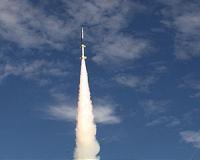 |
Science@NASA Huntsville AL (SPX) Apr 26, 2011 "Somewhere, something incredible is waiting to be known," wrote Carl Sagan. And now you can be the one to find it, thanks to Zooniverse, a unique citizen science website. Zooniverse volunteers, who call themselves "Zooites," are working on a project called Galaxy Zoo, classifying distant galaxies imaged by NASA's Hubble Space Telescope.1 "Not only are people better than computers at detecting the subtleties that differentiate galaxies, they can do things computers can't do, like spot things that just look interesting," explains Zooniverse director Chris Lintott, an astronomer at the University of Oxford. Zooite Hanny van Arkel, a Dutch schoolteacher, discovered a strange green object floating in her cosmic soup. When van Arkel noticed this unusual greenish object and posted an image of it on the Galaxy Zoo forum, not even the experts knew what it was.2 They named it "Voorwerp," Dutch for "object." Another group of Zooites found green "peas" in theirs, and dubbed themselves the "Peas-Corp." The peas turned out to be small, round green galaxies about a tenth the size of the Milky Way. These are now believed to be the most efficient star factories in the universe, forming huge numbers of stars in a hurry. "It was easy to find 'peas' by computer once we knew they were there, but without the human factor we'd never have noticed them," says Lintott. Lintott started Zooniverse in 2007 to solve a very large and unique problem: "I had too many galaxies on my hands," he explains. Lintott was faced with classifying, by shape, one million galaxies imaged by the Sloan Digital Sky Survey. First he did what any self-respecting scientist would do. "I asked a graduate student to classify them." The student was good at it, but after he catalogued 50,000 images, it was obvious he needed help - a lot of help - sorting the other 950,000. The solution came to Lintott and the very relieved student while they were sitting in a pub. "Why not ask for volunteers?" Zooniverse and its first project, Galaxy Zoo, were born. "We were blown away by the response. We had so many hits that our web server crashed on the first morning!" They quickly solved the server problem and the project took off. With the Hubble Space Telescope, Galaxy Zoo is taking volunteers deeper into the cosmos than ever before. And the Zooniverse team has proven that the Zooites' classifications are as good as those by professional astronomers. "Their contributions are extremely important," says Lintott. "They're helping us learn how galaxies form and evolve. And they take their work seriously." But that doesn't prevent them from bringing a sense of adventure and just sheer fun to the research. "Not long ago some Zooites asked us to take them on a pilgrimage to Zooniverse's birthplace. There was quite a celebration at the pub that night!"3 After Galaxy Zoo kicked off, scientists began approaching Lintott at conferences asking for help. "They realized that we'd found a great way to sort a lot of data fast." Zooniverse now offers several citizen science projects, including three more using NASA data. Moon Zoo volunteers use data from NASA's Lunar Reconnaissance Orbiter to count craters, helping write the history of the moon. Milky Way project participants scour infrared images gathered in two NASA Spitzer Space Telescope surveys of the Milky Way's inner regions. They help astronomers catalogue intriguing features, map our galaxy, and plan future research. Zooniverse's Planet Hunters are helping NASA's Kepler telescope find stars likely to host planets. "I'd love to confirm one of their finds and be able to send an email to someone saying, 'You've found a planet!' " Now, please excuse this writer. She has planet hunting to do.
Share This Article With Planet Earth
Related Links Zooniverse Astronomy News from Skynightly.com
 Could Low-Cost Space Missions Keep Astronomy Aiming High
Could Low-Cost Space Missions Keep Astronomy Aiming HighLondon, UK (SPX) Apr 20, 2011 Whether in the present so-called 'age of austerity' or more generous times, arguing for funds for space exploration can sometimes be hard and constrained budgets mean that some excellent scientific proposals never see the light of day. On Tuesday 19 April, in his presentation at the National Astronomy Meeting in Llandudno, Wales, Leicester University astronomer Professor Martin Barstow will argu ... read more |
|
| The content herein, unless otherwise known to be public domain, are Copyright 1995-2010 - SpaceDaily. AFP and UPI Wire Stories are copyright Agence France-Presse and United Press International. ESA Portal Reports are copyright European Space Agency. All NASA sourced material is public domain. Additional copyrights may apply in whole or part to other bona fide parties. Advertising does not imply endorsement,agreement or approval of any opinions, statements or information provided by SpaceDaily on any Web page published or hosted by SpaceDaily. Privacy Statement |